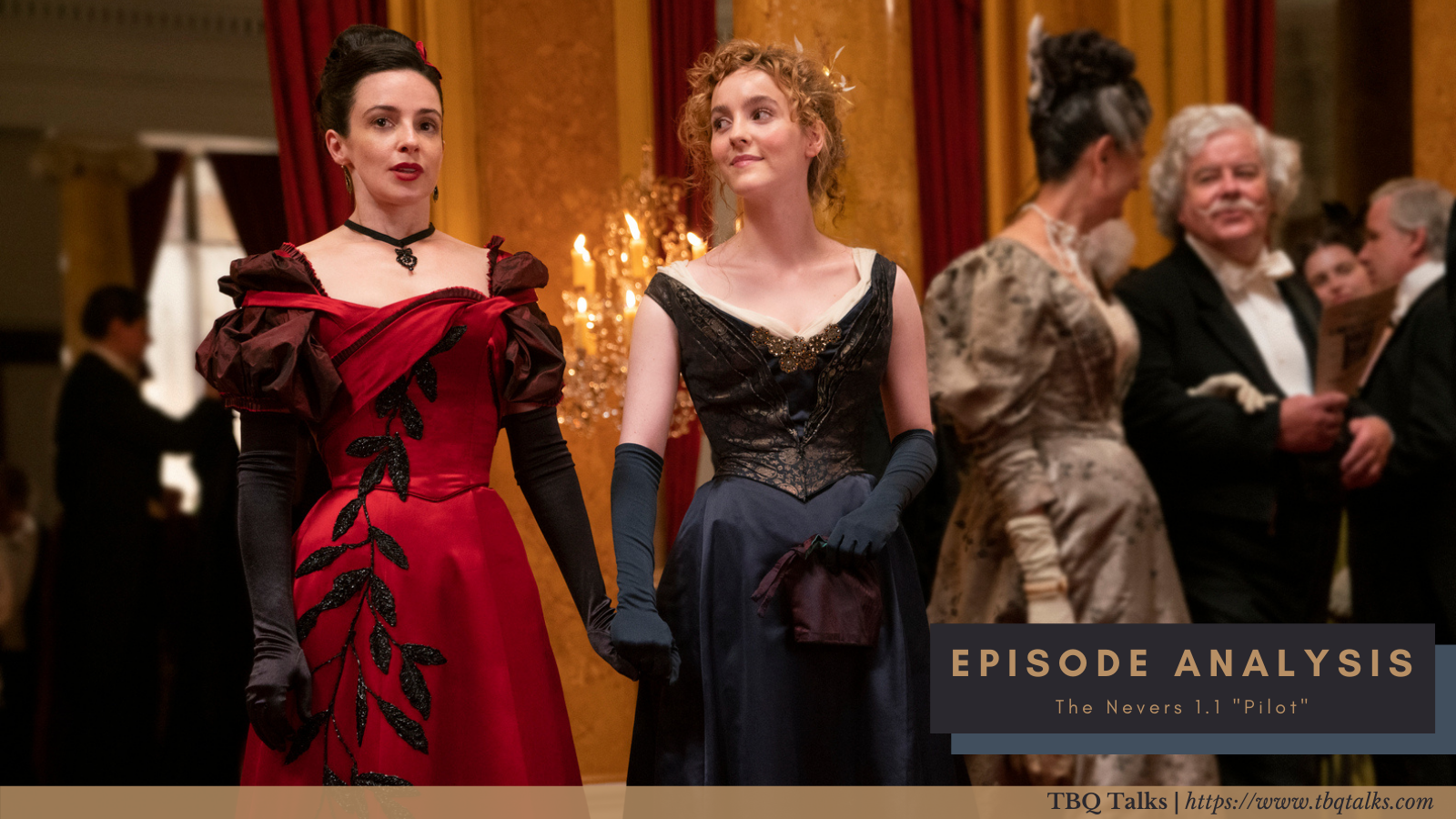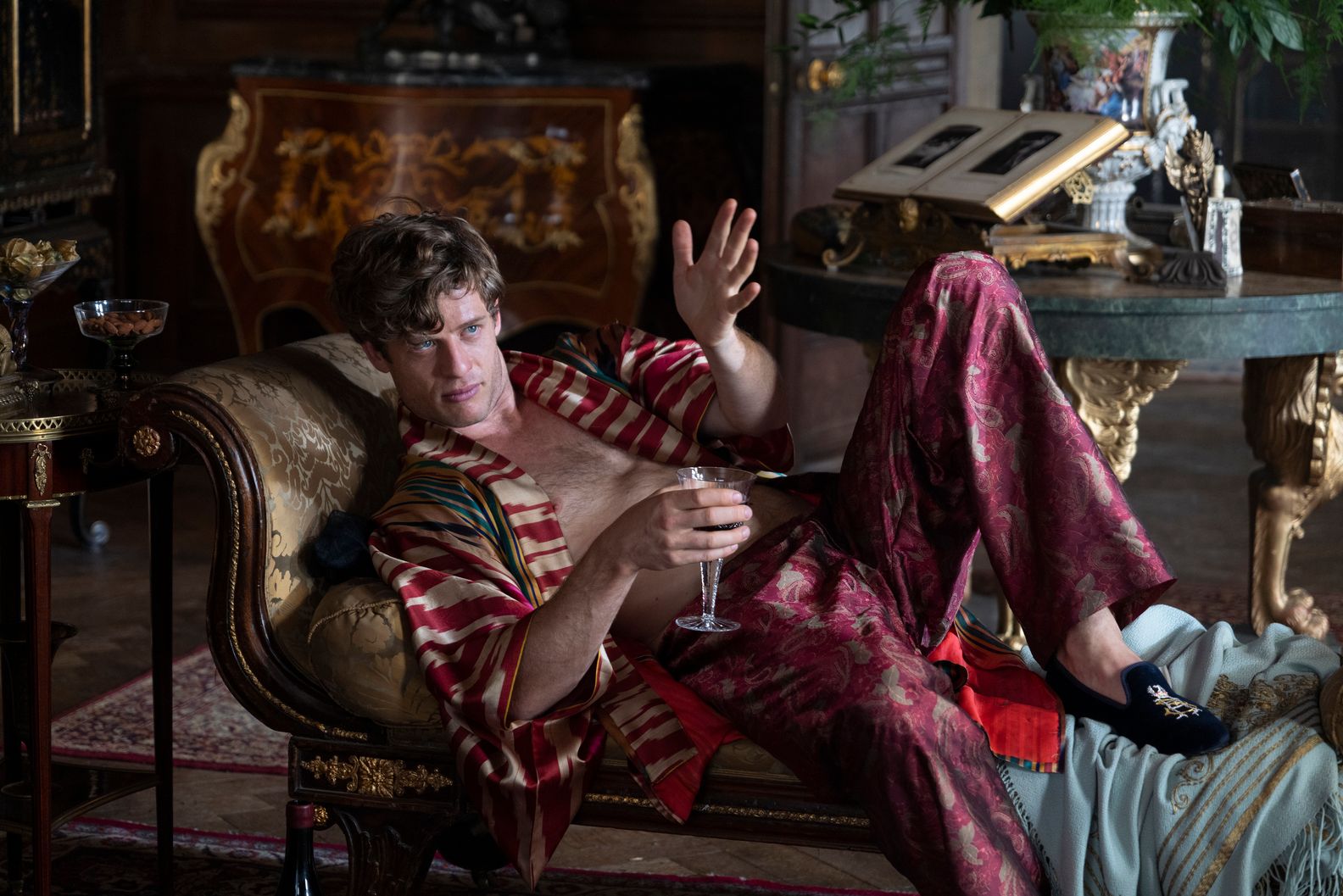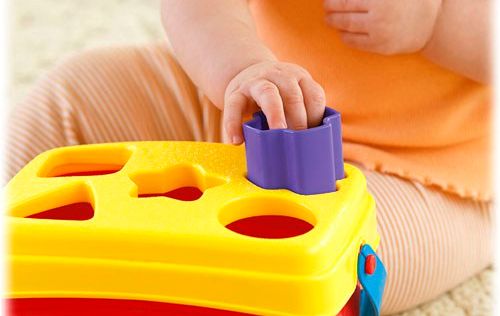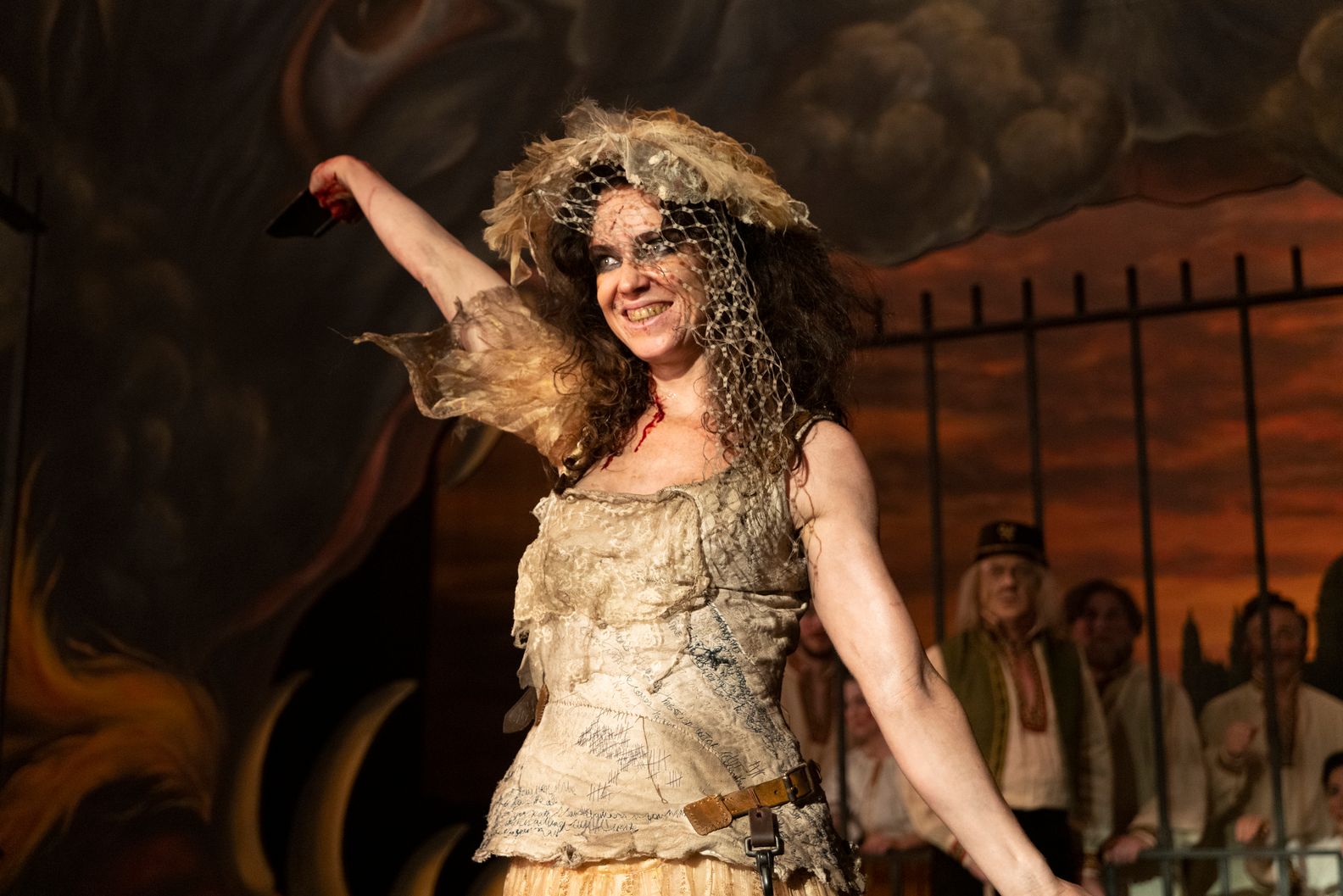The Nevers Episode 1 Analysis: A Show That's Not Really About Anything
Joss Whedon's latest show fails to be interesting enough to even hate watch. Plus discussion of its depiction of mental illness and historic accuracy.

Here there be spoilers for episode 1 of The Nevers. Proceed at your own risk.
Disclaimer: As an Amazon Associate I earn commissions from qualifying purchases via links to Amazon in this post.
Intro
The thing that strikes me most about The Nevers is just how low effort it is. Which is remarkable for something which did have a lot of work put into costumes, set design, and crowd control. (Possibly hair and makeup as well, those aren't my areas of expertise.)
Of course it's worth noting that those are parts of production that Joss Whedon's going to have the least amount of effect on because what he loves to do is write and direct. I'm not saying he never has input into costumes and sets, just he's never going to have as much input given that those aren't his areas of expertise either.
Get beyond those aspects however and what you have is mostly... there. The premise is interesting enough but it's the same premise of finding some kind of excuse for people with different kinds of powers to come together and save the day. This particular version of the trope doesn't even bother rubbing the X-Men serial numbers off that much since it's an orphanage instead of a school, it takes place in Victorian times instead of the modern era, and the wheelchair using person in charge is a woman instead of a man. (Still British though.)
And that's just it. I mean maybe it's pilot syndrome where so much time has to be spent introducing everyone and everything but by the time the credits rolled, other than two things which made me want to 1) throw things and 2) scream WTF???? in that order I was left feeling like I hadn't actually watched anything at all. Nothing happened to distinguish it enough from all the other versions of this trope to make me able to give a case for why people should watch it or, for that matter, why they should not watch it. In many ways there wasn't even enough substance to it to enjoy it as a Joss Whedon hate vehicle. Though god help your liver if you had "shot of bare feet" on your Joss Whedon drinking game. Woof.
The Show As A Whole
The ruling I keep coming back to is that the show is there. It's just there. It sits on the table, being itself, and offers nothing. Could you make fanfic out of the premise? Sure. Is there shippy chemistry between various pairings of characters of various sexes? Yeah. But is there anything here to make someone point excitedly at it and go this! This show! You're getting this from this show and nowhere else! Not really. Even the "scifi/fantasy elements in Victorian times albeit with middling writing" thing was done by Carnival Row and you're probably getting access to that one free with your Amazon Prime account. Plus their costumes were more interesting since they had to figure out how to do things like accommodate fairy wings.
(Shameless Plug: If you don't have an Amazon Prime account you can get a free trial for 30 days by signing up through this link. If you use that link you also help out this site because I am an Amazon Affiliate so, yanno, win/win.)
I can't even get a handle on why it's this way and I have years of practice of knowing what Joss Whedon puts into a script and into his directing to guide me. I'd suspect him getting his ass kicked off set... ahem, I mean him leaving of his own volition due to the challenges of filming during a pandemic, had something to do with it but normally I have a good read on when Joss's style gets interfered with by others as well. Sadly this is my "touched" power and yes I do wish it was something far more useful.
You could call it lazy but laziness still implies some level of effort being put in. This is a show where Penance being able to fix a water pump means she is destined to become a great inventor. Because replacing a broken pump piece with something of the same approximate shape and size is difficult? Apparently?
Then you have character introductions like this.

Laziness implies this pose was picked on purpose. "Hedonistic guy lays suggestively on a couch in a silk robe with his chest bare during a meeting when it's inappropriate to do so" isn't a choice, it's what your actor does as the temporary starting point so the lighting can get set up and then you're supposed to ask him to actually do something.
And I know you'll be shocked - shocked to learn that the first time we see this guy he's in bed with a woman and then he turns over and GASP! A man!
Much like with the moment of Penance fixing the water pump I'm left sitting there not being guided by the story so much as I want to turn to Joss (who is clearly standing behind the shoulder of every audience member going "Get it? No, really, did you GET IT???") and ask him if he understands that his feeling that these story points are shocking says far more about him than it does about the characters.
Obviously the answer is that no he doesn't. But still, when "She fixed it! See!!!" amounts to her doing a task that actual human babies can accomplish the implication is not that Penance is clever but that Joss doesn't understand the base level intelligence of most adult women.

Then you have characterization, much as we get any. Really the only ones we get something of a read on are Penance (nice and religiously inclined) and Amalia (Robert Downey Jr's version of Sherlock Holmes).
I'm not even joking about the Amalia part. One thing Joss loves to do is flat out write characters like other characters. Tony Stark in the Avengers got Xander Harris style dialogue, for instance. Amalia exists in the late Victorian era and uses an ability to deduce - ahem, I mean see into the future in order to defeat her opponents in bare knuckle brawling. She's got some kind of substance use and/or alcoholism problem hinted at in the previews of future episodes and in the pilot she gets not one but two superhero landings.
Yanno, just in case it was subtle that Joss still has bitterness issues over the fact that he didn't like RDJ giving him notes.
As for the rest, much like the show itself, they're just there. In one scene Myrtle, a child who was locked in her bedroom for three years, nearly kidnapped, saved by Penance and Amalia, is riding to her new home in a zippy motorcar that all but magically appeared out of a horse drawn carriage. And her facial expression is... nothing.
I'm not including a screencap because I don't want to make fun of a child actress. But my point is that from a directing standpoint "Holy poop I'm in a shiny vehicle the likes of which I've never seen before after being rescued from a kidnapping!" should have some kind of expression beyond "I do have a face and I can turn my head in various directions."
This is what I'm talking about when I say it's not even lazy. Lazy implies at least some level of effort.
Of course sometimes effort can backfire.
The Problem With Maladie
If I was meeting The Nevers on its own level I'd write "Maladie is the same as Dru," hit send, and then go grab a cup of tea. But this is a problem with media as a whole so you're getting my rant about it.
Here's the thing: mental illness exists. I know we're in a fantasy world with magic abilities and blah di blah but mental illness isn't magical. Moreover, the show tells us that Maladie (which I assume/hope isn't her given name) was ill before the event happened.
That means human illness. That means known thing.
Far too many shows, movies, directors, and actors equate mental illness with madness with oooo wacky!!
Now with Joss we know the problem starts with the script. In this particular case he gave Maladie every bit of "She's like Ophelia from Shakespeare, get it - GET IT???" dialogue to the point where I wanted to find a way to email Joss to tell him to leave poor William's dick in peace since the man's been dead for centuries.
The actress herself, Amy Manson, did talk about being inspired by real killers and someone having a manic episode. So some credit there at least. But that points us back to the directing as being the biggest issue after the script.
Here's the thing. There's an old acting saying that someone drunk isn't trying to fall down, they're trying to stand up. A character who has a mental illness isn't trying to tell everyone how wacky they are. They are saying things which make sense to them, they are saying things which they believe to be true.
Nothing about Maladie suggests anything besides "I'm crazy so I talk like poetry! La la la! Angels and Shakespeare phrases! Did you note I'm talking this way? That's because I'm crazy!!"

And yeah, I get that Joss thinks that the poetry has symbolism and meaning in it but it's too fucking try hard. That's why I started this by saying mental illness exists in the world. If you are going to write about a character with normal human mental illness - which again is what Maladie was established as having, this isn't The Nevers' version of Tasha's Hideous Fake Insanity - then you have to start with what illness(es) they have first and write the dialogue from there.
What does Maladie have? What are her symptoms? Was any thought given to how her mind actually works and shapes her character or was a post-it that said "Wacky plot conveniences + my aspirations to improve Measure for Measure" put in her column on the white board in Joss's office while he called it a day and went for tea?
Mental illness isn't an excuse to write a character who doesn't act like a human being! Maladie isn't a person. She's a human shaped shitty poetry device. Joss needs to stop it and every other director and writer who treats mental illness this way needs to stop it.
Let's Talk About Research and History
Look, the minute you bring magic into the equation I feel all bets are off for historic accuracy. Obviously the show is making a clear break from the real world, so this isn't the time to be all "UM, actually during August 1896 gentlemen wore four buttons on their shirts, not five so, uh, FAIL." about it.
On the other hand the show did keep referring to actual historic events. And I feel like the divide there is "Stuff that's worth giving more context on" and "stuff that Joss clearly included for us to praise him for how smart he is so let's see if he actually did the research or should just STFU forever."
Do I even need to give you a spoiler alert for that last one?
Some things are pretty obvious. I assume someone like Joseph Merrick is well known enough that I don't have to do whole essays on him or every other quick history name drop.
Hitting less obvious ones then, in no particular order. Also it's history and it's me so I get wordy. Hence some subsections.
Economics
Myrtle's parents talking about "new labor laws" which meant Myrtle was the only one of their children who could hold down a job is probably actually a reference to the education laws which made schooling compulsory for young children up to a certain age. Which does tie in with how the other kids we see in the home appear to be younger than Myrtle.
Kids in school were kids who couldn't be working during that exact same time. This was a financial hardship for the lower classes where the tiny amount your kids brought in could truly be the difference in whether your family still had a home by the end of the week.
Children could test out of schooling once they reached a certain age and there was often a great deal of pressure on them to pass those tests as quickly as possible so they could get back to working. So it would not be out of the realm of possibility that three years ago Myrtle's parents had been counting down the days until Myrtle could go work in a factory or some such only for those aspirations to be ruined by her getting her powers.
Where the show fails is that in no world, magic or otherwise, would a family that dependent on child labor live in a house that nice. I know that the way Penance and Amalia look at things is supposed to suggest to us that the home is awful but I can assure you that in 1899 a home with two floors and multiple rooms let alone bedrooms is fucking luxury, never mind how much the wallpaper is peeling. In modern parlance Myrtle's family is living in a one bedroom apartment located in Times Square. Sure it may sound like it's not impressive but if you understand real estate for the area then you know that for that place and time it actually is.
What would've been much more common for a family like Myrtle's is a one room living space which they rented either week to week or day by day. I get that for the purposes of plot they needed Myrtle to be in another room to get kidnapped without anybody seeing. Plus the needs of being able to have actors and lighting and sound and cameras and so on in a set means that the home will be designed bigger for TV than it would've been in real life same as every other dorm room and apartment we've ever seen in media anywhere. So I don't really hold it against the show that much, I just find it amusing.
But establishing Myrtle's family as being so poor they needed her to work, as well as the actual impact the education law had on the finances of poorer families, means that the show is at least pulling somewhat from the economic issues of the actual Victorian era. So it then becomes anachronistic for Mundi to get on that construction worker's case about being worried about a schedule. A laborer like that would have had no power to be wasting time on the job. Not only did he have no standing to tell his boss he's taking a break but any time he's not working is time he is not getting paid. Time he's not getting paid is money that his family needs not to go out on the street.
Which isn't to say Mundi wouldn't still be a dick about it, but being a dick in a way that suggests the laborer has a choice here is ridiculous. It'd be more realistic for him to be pissy about how the laborer can't fly since, again, we're in a world of magic so at least that is possible.
Technology
The show has an incredibly odd relationship with technology. Like even within the worldbuilding of the show itself it doesn't make sense. For instance I'd be happy to allow that in a world of people with Penance's powers there was a quantum leap in what inventions were made. However it's stated outright that only about eight cars exist in the whole world. So... shouldn't people be having reactions to seeing one? Penance, Amalia, and Myrtle go speeding through the street and nobody even glances in their direction. Which is very New Yorker of them (I say as one myself) but still.
So with this one it's not me so much going FAIL as it is giving more context and you can do with it what you will.
So yeah: Cars? Not normal. Horseless carriages had been tried on several occasions going well back into earlier that century. But they weren't common by any means. I think pretty much everyone knows that cars weren't considered even remotely something which could be considered hum drum every day until well after Ford got his hands on them.
Electricity in the real world was not as common as it is in this world. The thing which stood out to me the most was that they had electric lights down in that tunnel they were building which... no? They didn't have the infrastructure for that. Remember how in the first season of Downton Abbey it was a matter of debate if they should get electric lights into the manor? That season took place from 1912-1914. The issue wasn't if shit was invented it was if people had the ability to use it. You know how everything electric in your house needs to at some point connect to a plug in your wall which itself is connected to a grid? Yeah. That wasn't built yet at the time the show takes place.
(Personal generators were a thing before that but those were expensive and not something you'd waste on a train tunnel project where the workers were considered expendable. I had a relative work on the train tunnels in New York in the early 1900s who died while doing it so I know whereof I speak.)
This also means citing "x-rays, wireless, and electricity" as the things which make the current age remarkable also does not ring true for someone of the era. I get that for a TV show they're going to name things that will sound significant to a modern audience. But for the time in the real world those aren't the things that someone would most likely point to as the examples of technology which is both impressive and has an impact. Think of it this way: If I asked you, right now, to name the most impressive piece of technology in the world right this very second would you name a Tesla car or would you hold up the thing in your hand that's allowing you to read these words in the first place?
But again: modern TV audience so I get it. But if we were going for something closer to accuracy the development of the railway system would be far more likely to be the go-to mention. Not the least of which is that the creation of railways was the internet of its time in terms of the impact it had on communications, commerce, politics, news, education, food, the industrial age, military tactics, and the ability for Britain to even have an empire just to name a few items. Hell even the concept of time was affected by the railway system. X-rays, wireless, and electricity became important but, unless somebody at that table had Amalia's future-seeing abilities, that wouldn't have been something anyone there would've considered in the top ten list of examples.
Personal Notes
No pun intended when you see what the topic is about.
Of course we have to get a "OMG YOU CAN'T BREATHE IN A CORSET!!!" scene. While yes the concept of tight lacing did sometimes come up during the Victorian era, the fact that entire swathes of people wearing corsets did not drop dead on the streets should tell you and everyone else on the planet that corsets did not actually cause suffocation. You can breathe while wearing a corset and if you go over to YouTube there are ample numbers of costumers who are happy to show you that it's possible to do Cross Fit and run marathons while wearing them as well.
What makes the moment in question even more absurd is that Amalia would've been wearing a corset the whole time. That's what women of the era did. She hopefully put a fresh corset on given that she was stabbed through the one she was wearing earlier but still. All corset all the time! (Except when we see her in her shift in the morning, obviously). Her feeling a need to comment on wearing a corset to Penance as though that exact moment made a difference is about as natural as the "You were like this at ETON" line earlier on when most people would've just said "school."
One bit of credit where due, though, which is that Laura Donnelly did not do the typical actress press tour bit of whining about corsets when asked about them. She even praised the corset for being useful in the fight scenes, so kudos to her there. Also presumably kudos to the costume department which was able to make sure that she was in corsets which fit her properly.
Another item of personal note is the scene of Penance doing some grooming. It amused me that the scene was meant to convey that Penance is the type who forgets to take care of herself but in actual fact she's doing fairly normal grooming for the time. Sure in modern times if all we do is splash some water on our pits and rub a finger across our teeth we're phoning it in. But in Victorian times baths - as in literal full tubs of hot water - were not common. Showers are not a thing (unless you're pouring a bucket of water over your head.) Running water and sinks are still considered quite fancy.
Victorians did groom themselves, absolutely. This is not the myth that historically people were stinky. It's just that they did it in different ways. The sweat and dirt of the body was picked up by the shift or other undergarments that were worn next to your skin and that was the thing that typically went into the laundry. (Outer clothes tended to only be spot cleaned as needed.)
For personal grooming the method most often used is what we'd consider a sponge bath today. You'd stand over something which could catch the water and use a cloth, sponge, and perhaps some soap and basically spot clean yourself. Use a bucket or pitcher of water to rinse yourself off and jack's a donut, there you are.
For cleaning your teeth you might have a purpose made brush if you were fancy (possibly a roughed up thin stick from a plant if you weren't) and you'd either use ash or possibly some tooth powder for a cleansing agent, again depending on how fancy you were (read: how much money you had.)
So Penance was actually fine. I mean it's possible that between Penance's inventions and the others' powers that the orphanage has its own plumbing and hot water system. Heck even some homes in the real world had hot and cold water on tap well before the year this show takes place. The issue isn't if it is possible, just that it amused me that we were supposed to consider Penance to be the odd woman out when really she's doing what the vast majority of people those days did.
Racism
I'd be remiss if I didn't address the issue of racism both of the era and of the present day. The show is making stabs at diversity by having Black and Indian characters (I assume the latter based on the British empire, it's not specified where the characters are from in the episode so I could be wrong.) It's too early to say how well the show is going to handle them given that the vast cast of characters shown in episode one meant that they, like most tertiary characters, barely got any screen time.
But there's one moment in the show where a word gets used which has to be called out for the absolute bullshit that it is.
In one scene Myrtle's father uses the term "Ch*naman." Fuck you, Joss. For real, Fuck. You.
Is the term and the racism historically accurate? Sure. But so are a LOT of other offensive terms and Joss knew better than to go to that well even though there was a scene of the Black doctor talking about why he wasn't working for the royal family even though he had considerable talents.
No, the use of the term in a show being aired in 2021 indicates the pervasive problem of how slurs and slights against AAPI people aren't considered as horrifying as they should be. The term is offensive enough as it is. That nobody thought to edit it out especially now when there are people being attacked and dying because of this prejudice is inexcusable.
I don't want to hear a single word from anybody about historic accuracy making the term okay. It's a fictional show being aired in the present day. There's no excuse. Do better.
Lagniappe
- Seriously, do not take a shot every time you see a woman with bare feet. You will die.
- Joss cribbing from himself includes "it's only a prototype" which is almost Sorkinesque in how often he grabs that turn of phrase.
- Amalia says she can't make her visions of the future come on purpose yet she can use them whenever she's fighting?
- Thoughtful of those thieves to take Myrtle's leg braces off before they kidnapped her.
- I'm curious about what an expert in old newspaper formatting would say about Maladie's headlines.
- You can't have a show about a thing which primarily affects women and never once address the issue of transgender and non-binary people. It's only been one ep so it's too early to say if the show will or won't do this. I'm just stating for the record that it needs to or else it's more examples of the lack of effort to engage with its own writing.
- Really handy that Myrtle can draw so well even though she's a child who's been locked up for three years
- Thank god entire minutes of this episode were spent on the discussion of "the employed" vs "employee" as a term. I know I can sleep better at night now that I know what fictional characters think about a term the French invented in 1825.
- As soon as I saw a Black female character with powers in the commercials for the show I knew she would be a bad guy. Ever predictable, our Joss.
- There was literally no reason for an entire opera audience to sit there and let Maladie monologue for as long as she did. Even with the woman with fire and the guy with the gun there were hundreds of people in that building, many on higher floors. They could've bolted for the exits as soon as Maladie showed up and nothing explains why they didn't.
- Speaking of fire, good thing Amalia found that tiny puddle to save her when she was running away.
- No clue what's going on with "This isn't my face" but I'll say that the repeated refrain of "You look very fine" from Penance, especially at the end when Amalia was out of sorts, is giving me Dollhouse trigger word vibes. (Or whatever they called it, I'm not looking it up.)
- A giant fucking spaceship. Sure, why the hell not?
And that's it for now. I'll probably continue to watch the show but mostly because I'm curious about how the vibe of it will change as Joss's hold leaves and the new showrunner takes over. I make no promises about doing regular analysis of it, though. If all of the eps are like this one I think I'm going to come out on the side of "meh" too much to feel the need to keep saying anything.
But who knows? Maybe next week will be different. Just have to see.
Outro
Want to help support the site and get access to the Bonus Content? Sign up for a paid subscription or donate via Ko-Fi. Thank you!

